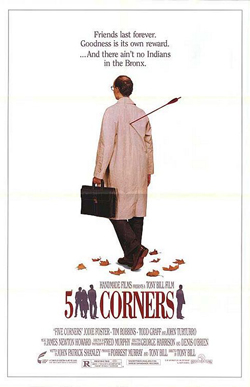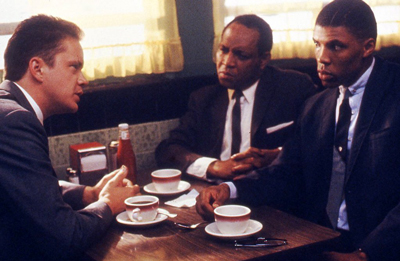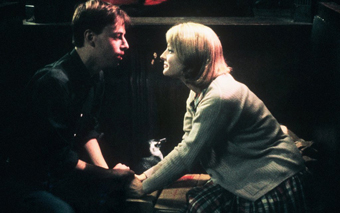
 |
|
|
|
Playwright, screenwriter and director John Patrick Shanley can do no wrong in my book, after Moonstruck, Joe Versus the Volcano and Doubt. His first movie Five Corners has shows the same original personality at work. Five Corners occupies a special position among independent films of the 1980s. Star Jodie Foster is the old hand at work, surrounded by impressive new talent: Tim Robbins, Todd Graff, John Turturro, Elizabeth Berridge. Audiences and critics loved the performances, even as they chalked up Shanley's script as "quirky", "disorganized" and "messy". Shanley sets his story in The Bronx of 1964, taking an American Graffiti- style sampling of life among a handful of active young people. Director Tony Bill brings most of the scenes to life, capturing essential non-verbal communication between the characters and giving Five Corners an uneasy edge that distinguishes it from other coming-of-age dramas. The show's rich characters generate genuine warmth. 
An algebra teacher is murdered in a very strange way, causing a pair of detectives to wonder if there are still any Indians loose in the Bronx. The cancellation of school frees up Castro and Willie (Rodney Harvey & Daniel Jenkins) to pursue idle kicks like blowing up a store's sign. Picking up Melanie and Brita (Elizabeth Berridge & Cathryn de Prume), a pair of pill-popping and glue-sniffing teens, they engage in more risky behavior, like riding on the top of an elevator. Three more locals become alarmed when the psychotic Heinz Sabantino (John Turturro) is released from prison. Heinz was locked up for trying to rape Linda (Jodie Foster), who continues to work in her father's pet shop. Linda's bartender boyfriend Jamie (Todd Graff) tried to stop Heinz but ended up with a broken hip and a permanent limp. Linda instead turns to Harry Fitzgerald (Tim Robbins) for protection -- he's the one that saved both Linda and Jamie by busting a beer mug over Heinz's head. The problem is that former tough guy Harry has become a pacifist, inspired by the death of his hero cop father and the speeches of Dr. Martin Luther King. Harry is interviewing to become a Freedom Bus rider to help integrate the South. Heinz contacts Linda and forces her to meet him in the park at midnight by threatening to hurt Jamie. Linda leaves a message for Harry, who may or may not receive it in time to offer his protection. Five Corners, like Doubt, was inspired by John Patrick Shanley's neighborhood, a rough locale where common courtesy seems to be a rare item. People have a habit of taking walks in the middle of the street instead of on the sidewalks. Even Linda has an adversarial relationship with a kid who wants to buy a guppy. The Jewish proprietors of the deli are sweet men, and a definite exception. More typical is Sal (Carl Capotorio), a Brylcreemed Romeo in a convertible. When he gets sick of his glue-sniffing sweetheart and her equally addled pal, he pays Castro and Willie to take them off his hands. Shanley comes up with some very rich characters, even if they all seem to be working in different movies. In a strikingly good scene, Robbins' Harry holds his own against a dismissive Civil Rights activist, a black man clearly unhappy that political reality requires him to recruit "rich white boys" to go up against the murderous thugs down in Alabama, so that the movement will get media coverage. Timothy Robbins' Harry is almost Gary Cooper-like in his resolve, determined to never again raise a fist in anger. That stance puts Harry in a bind when he must confront the severely unbalanced Heinz in a rematch similar to the finish of High Noon. Tim Robbins had been bouncing around in small roles since 1976 -- it looks like he's trying hard to be noticed in Top Gun -- and this was his breakthrough role. John Turturro acts as if he's playing the misunderstood monster in a vintage horror film. When the going gets tough, Heinz hoists the unconscious Linda over his shoulder and takes to the rooftops, just like the mystery killer in the Bela Lugosi thriller Murders in the Rue Morgue. Heinz carries a wicked scar where Harry's beer mug cleaved his scalp; he behaves as if part of his brain had been damaged. But we eventually learn the source of Heinz's madness -- his mother is a total loon, a grinning fool who refuses to recognize that her son has just come from jail. The great Rose Gregorio plays Mrs. Sabantino, and her scenes with Turturro are excellent. Ms. Gregorio's other great unsung role is opposite Robert Duvall in True Confessions. 
Jodie Foster actually hasn't much to do in Five Corners beyond flesh out the role of a modern damsel in distress. She manages to look okay in Linda's no-style hairdo and clothes and is convincing at all times. The strain comes when Linda delivers herself to the mad rapist Heinz to protect her boyfriend; we're missing a scene that lets us know what Linda is really made of. Todd Graff's crippled boyfriend Jamie knows he can't compete with Harry. Jamie is abrasive and insecure which in movie terms leads us to expect Linda to realign her affections with the tall and idealistic Harry. Todd Graff didn't get his just rewards -- you'll remember him in The Abyss but besides his honorable work in ensembles and TV shows, Graff didn't become a household name. The rest of the cast of Five Corners decorate glorified character bits. Elizabeth Berridge's fashion-challenged Melanie behaves like a slut wannabe while secretly hoping that her life will somehow straighten out. John Seitz's Detective "Bigfeet" Sullivan is a sane cop helping Harry Fitzgerald because he knew Harry's father. Kathleen Chalfant has good several good scenes as Harry's mother, who has just lost her husband and is certain that Harry will run off to Alabama and become a dead Civil Rights activist. Their household resembles the home in Shanley's Moonstruck. Harry even walks his dog at night, as does Cher's grandfather. Ms. Chalfant played Robbins' mother again in Bob Roberts; I've noticed her in both The Last Days of Disco and Duplicity. Five Corners attracted both praise and criticism for its fractured storyline. The rescue of Linda from the clutches of the crazy Heinz is like something out of D.W. Griffith, but the movie remains unpredictable because all the details are original. The overall tone remains consistent while its events veer all over the road. It starts on a note of absurdity when a man walking calmly on the street is struck down by an arrow. From that surreal extreme the movie swings into a kids-on-the-loose romp, with Melanie and Brita waking up naked in a filthy room, and not knowing how they got there. Then Heinz stomps back into the Five Corners neighborhood, setting the High Noon plot mechanism in motion. Major set pieces include Harry's contentious meeting with the black activists, the near-fatal thrill ride on the elevators and Linda's midnight meeting in the park. Heinz's twisted idea of a gift is to steal two penguins from the Bronx Zoo as a present for Linda; when she objects he batters one of the birds with a broken ball bat. Most but not all of the film's half-dozen loose strings get tied up by the finish. "Wild Indians" are still afoot, as if representing the permanence of mindless violence. 
The most satisfyingly resolved thread is the Civil Rights subplot, which puts Five Corners in bold contrast with Spike Lee's angry Do the Right Thing; I'd like to hear Lee and Shanley debate the issue of racial friction in the Boroughs. Director Tony Bill and cameraman Fred Murphy decorate Five Corners with arresting images that suggest symbolic meanings in John Patrick Shanley's script -- the animals, the hurtling elevators, etc.. This is one movie that ends in a veritable bloodbath, yet where the violence seems wholly appropriate. Five Corners was a notable underperformer and Moonstruck a big hit. They were released to U.S. theaters almost simultaneously, giving writer John Patrick Shanley a firm screenwriting debut. The ex- Marine was already an established playwright, and his 2004 play Doubt: A Parable was awarded the Pulitzer Prize for Drama. Image's Blu-ray of Five Corners is a good encoding (1080p) of a Handmade Film. Producer George Harrison begins and ends the picture with The Beatles singing "In My Life". The movie has previously been released on a number of cheap versions, giving rise to the notion that it had fallen into the Public Domain. The handsome widescreen HD transfer is sometimes dark and visibly grainy, but it's much sharper than any print or video I've seen, and the audio is also much improved. Because of the proper widescreen framing, this is the way to see this quirky, special picture -- you'll laugh at its final image. (note: the HD video quality is much, much better than the scene stills decorating this review.) Sadly, the disc comes with no extras, just a long string of Handmade Films trailers derived from a poor quality video source.
On a scale of Excellent, Good, Fair, and Poor,
Five Corners Blu-ray rates:
Reviews on the Savant main site have additional credits information and are often updated and annotated with reader input and graphics. Also, don't forget the 2010 Savant Wish List. T'was Ever Thus.
Review Staff | About DVD Talk | Newsletter Subscribe | Join DVD Talk Forum |
| ||||||||||||||||||